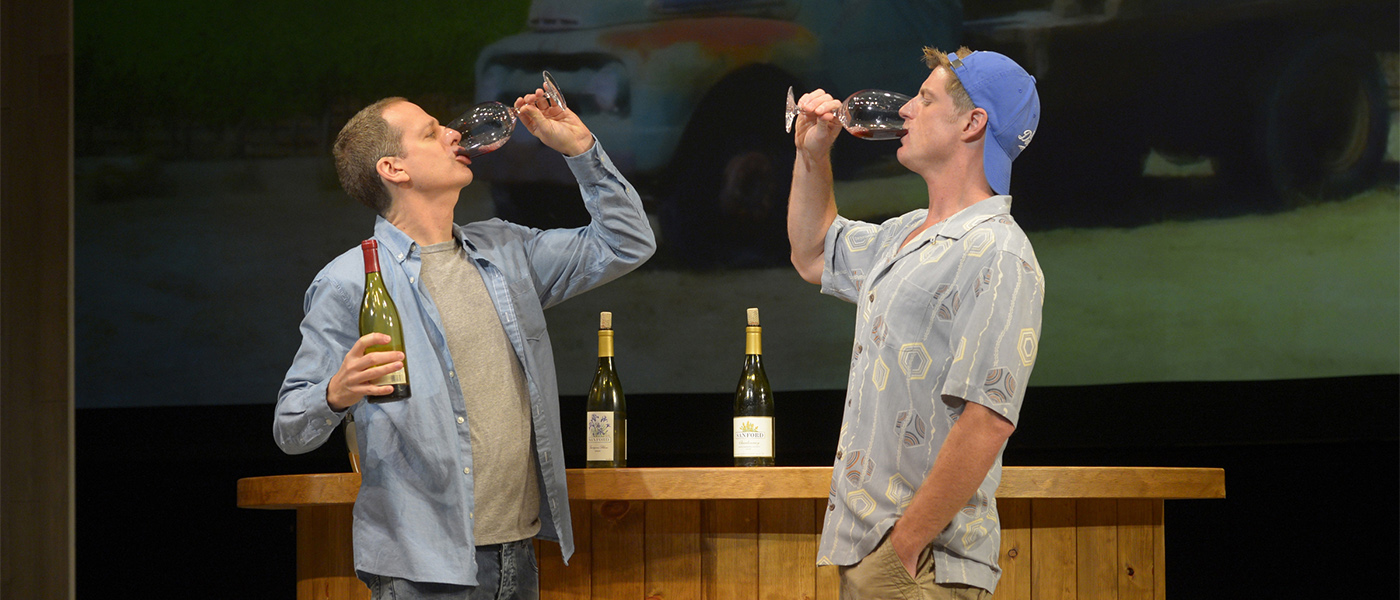
In honor of the 15th anniversary of the film Sideways (coming up in 2019), we sat down with Rex Pickett, author of the novel on which the screenplay was based. Rex Pickett’s stage adaptation of the cult classic premiered at the Ruskin Group Theatre in Santa Monica, and had several subsequent productions, including a run at La Jolla Playhouse that set box office records for sales of a non-musical. In Part One of this interview series, we focused on the inspiration for the novel and film, and journey from page to stage. (Read Part One here.) In Part Two, we chat about the ins and outs of adapting the well-loved story for theatre audiences, and get Rex’s advice for prospective producers wanting to take advantage of the anniversary of the film and program Sideways for their 2019/20 seasons and beyond.
Nikki Przasnyski: We know people love the film Sideways, but how does the play differ? Did you make any changes in order to tell the story theatrically?
Rex Pickett: There’s added value in the play as there are scenes with Miles and Jack, and Miles and Maya, that aren’t in the movie that I chose to put into the play. The play, based on my novel, is a pure distillation of my voice in the novel.
The movie, which I love — make no mistake about it, I love it. It’s 90% faithful to my novel — but it is filtered through Alexander Payne’s aesthetic sensibility. Emotionally he keeps things a little bit closer to the vest, I would say, than me. I don’t want to give away the ending of my play, but the ending is taken from the novel, is truer in spirit to my work, is different than it is in the movie. Payne didn’t like it for the movie, which I understood. He thought the novel’s ending was too sentimental, and he’s on record as saying sentimentality dates movies. I disagree with him. I said to him, “If you earn the sentimentality through the trajectory of the characters, then play it.”
I’ll tell you one quick little anecdote. Alexander Payne gave me every draft of the script. In the first draft of the script, Miles has that big soliloquy about Pinot Noir. Maya says nothing. Nothing, Nikki. She goes, “Huh.” In the second draft, she says nothing. Alexander was very interested in my notes. After that second draft, I remember writing in the margin, “Alexander, don’t you think Maya should have a complementary speech?” That’s all I wrote. In the third draft that he did, there appeared this long, lovely, heartbreaking speech about wine. I wept. It’s right out of the novel.
Other than “No fucking Merlot,” her speech on wine is the signature speech in that movie. I’m telling you, you take that out and Virginia Madsen, the character of Maya, has no character at all. She only has twelve screen minutes. But you take that three-minute speech out where she talks about the life of wine and that speech, the soul of Sideways has been ripped out… And it’s been done in many scene-study classes. I call it “the wine duo-logue.”
Nikki: It’s a great scene.
Rex: And the play goes deeper in a few ways than the movie, I think I can say, at the risk of immodesty. The top of Act Two when they’re in bed and Miles says, “Jack is getting married,” and then she says, “Oh, by the way, here’s this money.” It’s a risk-taking moment because it’s both emotionally wrenching and reveals Maya as a flawed character. Payne couldn’t go there. That’s actually my second-favorite scene in the whole play because it’s emotionally very raw, that scene. It’s right out of the novel. It’s a dicey scene because it paints her in a way where you could interpret her involvement in this whole thing…negatively. But I like the fact that she’s flawed. It makes her a more fully-developed three-dimensional character and it serves to give her more stage time — which was one of my goals: write the women characters so they have more scenes, more dialogue.
Nikki: It really does flesh her out and give her character more of an arc than I think existed in the film.
Rex: Right, right. Thank you. And you know what? It earns the ending now. Because she’s not blaming him for what went down, although she needed a few days to process it. I think if you earn that moment at the ending, you earned it by being willing to take that risk at the top of Act Two.
I’m willing to take that risk. I mean, Alexander takes risks, too, but I think those emotional moments, he tends to mute them.
Like the scene on the beach, he muted that in the movie and I don’t in the play.
In all fairness I’ll say this. The scene I’m talking about where Miles charges out into the ocean and goes crazy and Jack rescues him, I think that that scene might have played melodramatic in film because of the language of film. You can get away with it in a novel, of course, because it’s first-person. But in a play what I realized is that kind of melodrama, if done right, with actors that are really good and can sell it, it actually cuts more emotionally deeper and richer than the way it was done in the movie… Theatre allows you that luxury in a way that film doesn’t. You can take those risks because the characters, they’re right there and they’re so real, and there is a kind of, I guess, theatricality. There’s a heightened sense of things in theatre that you need to be careful about in film. But I think in theatre you now can go back to those more emotionally raw scenes. Theatre gives you permission to go there, I think.
Nikki: Definitely. There’s something different about actors live onstage creating an emotional moment truthfully every night. It’s a great tieback to what you were saying about like the magic that comes out artistically in those vulnerable moments in life. The ability of the actors to be vulnerable onstage is what allows for it to go a little bit more in-depth and less snarky than a film might have to be.
Rex: Yeah. And the other thing, too, in theatre is the audience. That actor in front of them is a real human being there. They’re not two-dimensional images up on a screen, and your heart goes out to them in a way that maybe in a film it’s going out in a, more dispossessed, different way. Your heart goes out to Maya in that moment in bed and when she hears this news and then has to confess this whole scheme about money and seduction, that obviously wounds her so deeply. Your heart goes out to Miles when he’s on that beach having a nervous breakdown about his life. You know, he’s babbling about pelicans. It’s funny. He needs to get this all out, and your heart goes out to them empathetically in both cases. And that is the magic and the beauty of theatre as opposed to film where those emotionally raw scenes would just be too over the top, come across as histrionic.
Nikki: Definitely. I’m also curious as to how the staging of the story progressed as it moved from an intimate stage at Ruskin to a much larger stage, at La Jolla. You’ve mentioned there are a lot of scene transitions — were those managed differently as the production value changed?
Rex: You know, in film they demand you to have a certain level of production value and everything else, but in that little fifty-seat Ruskin Group Theatre we did these little commedia dell’arte transitions for all the scenes. And you know what? The audience wasn’t taken out of the show. They didn’t care. We couldn’t do that in La Jolla because the commedia dell’arte would have looked amateurish, but we didn’t have to because we had the technology to have full-on Broadway transitions. But it can be done at both levels. And any level in-between. It worked at all levels equally. And it presents a unique aesthetic challenge to any future director.
Nikki: That’s great. Because I think this story has a lot of potential to appeal to companies of varying sizes, and not just because of the familiarity with the film. The title familiarity with Sideways might bring people in the door, but I think that you’re right that the play does have an immediacy and a vulnerability that the film didn’t have. And then it’s also just such a great opportunity if producers are in
an area where there are local wineries, tying in other businesses and making it a community event.
Rex: Well, first of all, Nikki, wine is in forty-eight states. They have wine in South Dakota, for God’s sakes. There’s wine in Canada. I mean, of course, there are famous wine regions. We did a final version up in Sonoma and Sonoma’s great. It was a limited engagement but it sold out every single performance. Cono Sur Winery from Chile — where I have great relationships — gave us free wine for the entire play. I donated it to the theater. It was great for Cono Sur because they got promotion out of it. I think a lot of theatre companies, if they’re smart, they’ll know that.
It just was so lovely to go there in the summer at Ruskin Group Theatre, because the play would start at 7:30 or whatever, and it was still light out and the patrons were holding these beautiful Pinot Noir glasses with their wine. The play is definitely more than just re-experiencing the movie. It’s an event.
The 15th Anniversary of the film’s release is coming up in October 2019, and there are already events planned for the celebration.
To purchase a copy of Sideways, click here, and to learn more about licensing a production, click here.

Newly Available for Licensing – January 2026 (UK)

Newly Available for Licensing – January 2026 (US)

